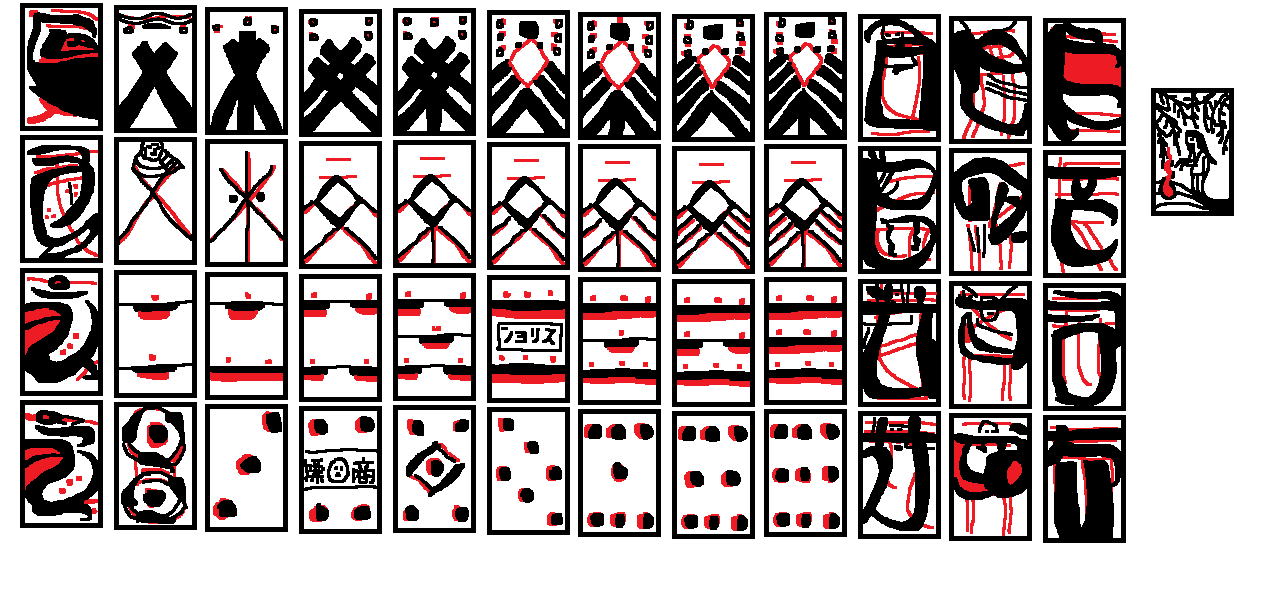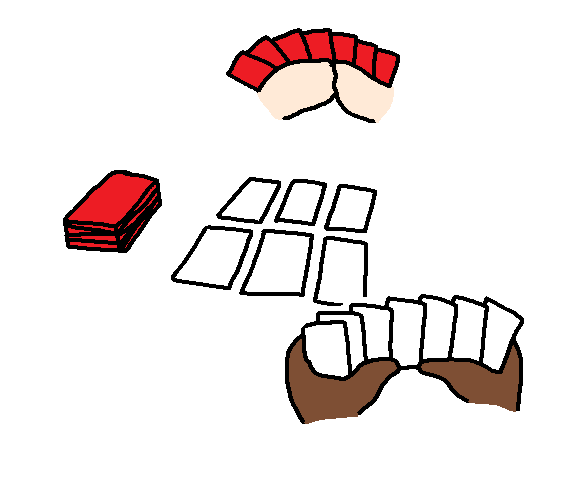Based on our observation, it is possible to play Hachi, a hanafuda game for two players loosely based on Hana Awase, using a Mekurifuda deck, and it may have been that the game was originally a Mekurifuda game before it was adopted into Hanafuda.

¶ Setup
Game setup involves choosing a dealer [親 - おや, oya], shuffling the deck, and distributing the initial cards. Players may also wish at this time to set the duration of the game, whether it be to a number of rounds, points, or victories. A common option is for the first player to win two consecutive rounds by a margin of 20 points or more to win the overall game.
¶ Choosing the Dealer
Choose the initial dealer as seen fit; a typical method is to shuffle the deck and have both players draw one card each. The player who drew the lowest number becomes the dealer. In cases where there is a tie, this process can be repeated.
In subsequent games, the winner of the previous round becomes the new dealer.
¶ Distributing the Cards
At the beginning of each round, the dealer shuffles the deck and distributes 6 cards face-up to the field and 7 cards face-down to each player. These face-down cards become the players’ hands; the remaining cards in the deck become the draw pile for the round and should be set face-down next to the field.
Note that unlike in related games, nothing special happens if 3 or 4 cards of the same suit are dealt to the field. Likewise, there are no “lucky hands” in Hachi.
¶ Gameplay
Each round, the dealer is the first to play.
On your turn, choose one card from your hand to play to the field. If it matches another card on the field according to the Capture Chart below, overlap the two cards indicating that you will capture them. If your card has multiple potential matches, you must select only one of them to pair it with. If your played card does not have any matches on the field, it will simply become a field card.
After playing a card from your hand and making a match as is appropriate, flip over the top card from the deck and play it to the field in the same manner as above, again making a match according to the Capture Chart if possible. Once you have played a card both from your hand and the deck, collect any cards captured into your scoring area. Captured cards are public knowledge, and should be arranged in such a way that both players can see them. It then becomes the next player’s turn.
¶ Capture Chart
Two cards are considered a match in Hachi if the last digit of the sum of the numbers on the cards is either 3 or 8. In practice, this means that cards marked as Group A in the table below capture cards in Group B, and vice versa; cards in Group C capture those in Group E, and vice versa. Group D cards capture other Group D cards.
| Group | Card Number | Possible Captures |
|---|---|---|
| A | 1, 6, 11 | 2, 7, 12 |
| B | 2, 7, 12 | 1, 6, 11 |
| C | 3, 8 | 5, 10 |
| D | 4, 9 | 4, 9 |
| E | 5, 10 | 3, 8 |
¶ End of Round
The round ends when both players have exhausted their hands. At this point in time, each player calculates their score taking the sum of their cards’ individual values and adding it to the total points for any yaku they have completed, according to the tables in the following sections. The winner of the round is the player with the greater number of points.
¶ Card Values
| Point Value | Type of Card | Number in Deck |
|---|---|---|
| 1 | Swords | 12 |
| 10 | All Other Cards | 36 |
¶ Yaku
There are 21 yaku in the game of Hachi, which exist as 10 pairs of All-Club and All-Sword variants, and one All-Sword yaku with no partner.
All Club Yaku are worth 10 points, while all Sword Yaku are worth 20 points.
All Japanese names in the list are from the Hanafuda rules of the game, and will remain so until we could find a reference material naming the Mekurifuda names of these Yaku. NEEDS MORE DOCUMENTATION
| Point Value | Name of Yaku | Composition |
|---|---|---|
| 10 | Club Mist Island 霧島 [きりしま, kirishima] |
Clubs 12(king), 4, and 11(horse) |
| 20 | Sword Mist Island 短の霧島 [たんのきりしま, tan no kirishima] |
Swords 12(king), 4, and 11(horse) |
| 10 | Club Elder 御老中 [ごろうじゅう, gorōjū] |
Clubs 5, 6, and 10(maid) |
| 20 | Sword Elder 短の御老中 [たんのごろうじゅう, tan no gorōjū] |
Swords 5, 6, and 10(maid) |
| 10 | Club Five Four Six 五四六 [ごしろく, go-shi-roku] |
Clubs 5, 4, and 6 |
| 20 | Sword Five Four Six 短の五四六 [たんのごしろく, tan no go-shi-roku] |
Swords 5, 4, and 6 |
| 10 | Club Seven Five Three 七五三 [しちごさん, shichi-go-san] |
Clubs 7, 5, and 3 |
| 20 | Sword Seven Five Three 短の七五三 [たんのしちごさん, tan no shichi-go-san] |
Swords 7, 5, and 3 |
| 10 | Club Kumano Mountains 熊野サン [くまのさん, kumano-san] |
Clubs 9, 11(horse), and 3 |
| 20 | Sword Kumano Mountains 短の熊野サン [たんのくまのさん, tan no kumano-san] |
Swords 9, 11(horse), and 3 |
| 10 | Club Eight Islands 八島 [やしま, yashima] |
Clubs 8, 4, and 11(horse) |
| 20 | Sword Eight Islands 短の八島 [たんのやしま, tan no yashima] |
Swords 8, 4, and 11(horse) |
| 10 | Club Nakazō 仲蔵 [なかぞう, nakazō] |
Clubs 7, 8, and 9 |
| 20 | Sword Nakazō 短の仲蔵 [たんのなかぞう, tan no nakazō] |
Swords 7, 8, and 9 |
| 10 | Club One Two Three 一二三 [いちにさん, ichi-ni-san] |
Clubs 1(dragon), 2, and 3 |
| 20 | Sword One Two Three 短の一二三 [たんのいちにさん, tan no ichi-ni-san] |
Swords 1(dragon), 2, and 3 |
| 10 | Club Den デン [でん, den] |
Clubs 2, 11(horse), and 12(king) |
| 20 | Sword Den 短のデン [たんのでん, tan no den] |
Swords 2, 11(horse), and 12(king) |
| 10 | Club Three Five Six 三五六 [さんごろう, sangorō] |
Clubs 3, 5, and 6 |
| 20 | Sword Three Five Six 短の三五六 [たんのさんごろう, tan no sangorō] |
Swords 3, 5, and 6 |
| 20 | [Sword] Ten Seven Eight 十七八 [じゅうしちはち, jū-shichi-hachi] |
Swords 10(maid), 7, and 8 |
